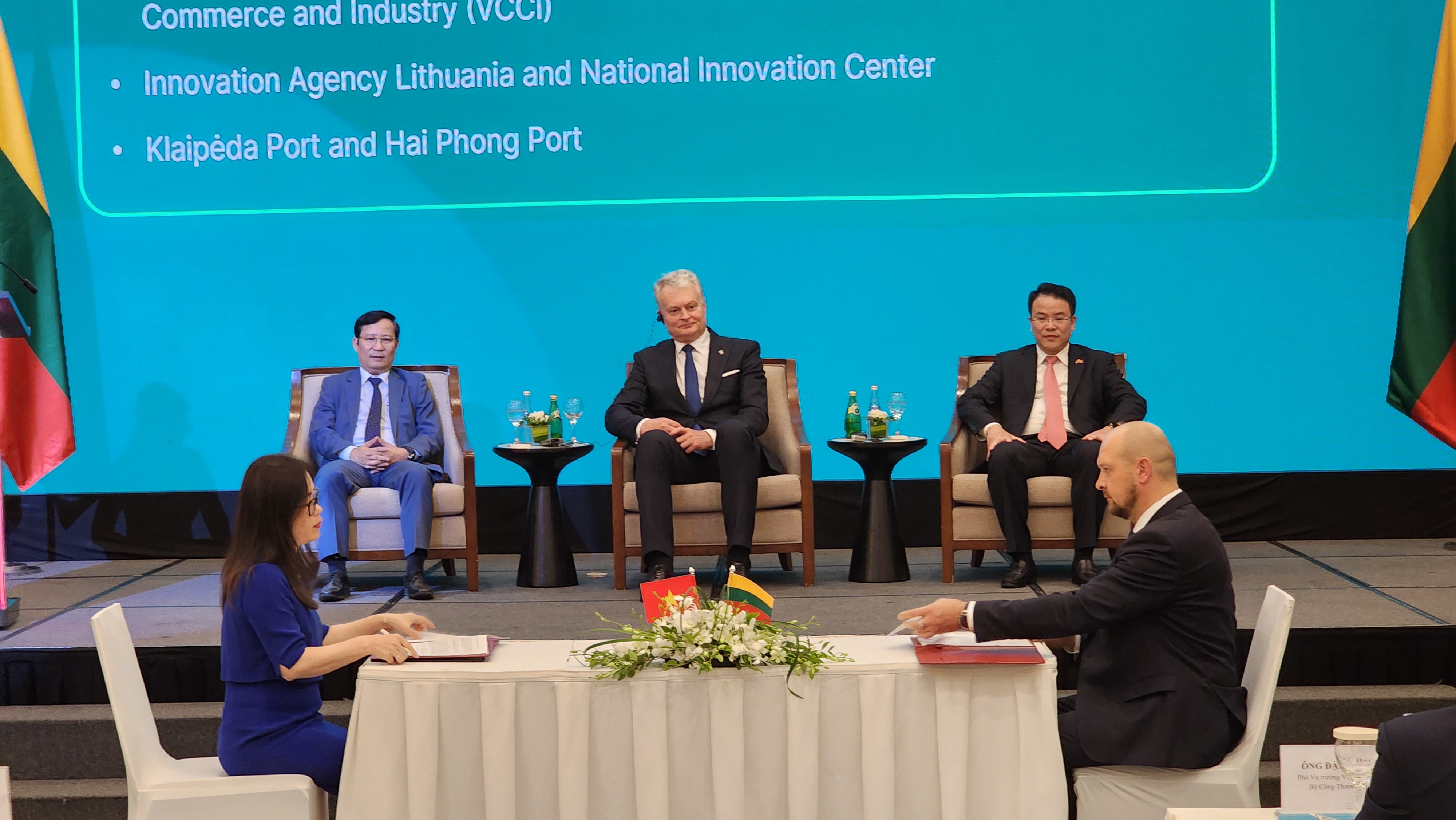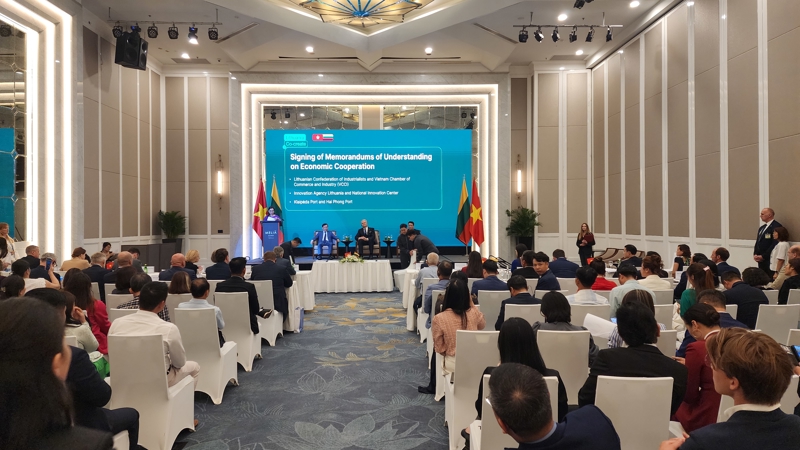The Vietnam Chamber of Commerce and Industry (VCCI), in collaboration with the Lithuanian Embassy in Singapore, concurrently accredited to Vietnam, held the Vietnam–Lithuania Business Forum in Hanoi on June 12, as part of Lithuanian President Gitanas Nauséda’s official visit to Vietnam.
Speaking at the forum, President Nauséda noted that despite the geographical distance, Lithuania and Vietnam share many similarities in their economic development journeys. The two nations also represent opposite ends of the strategic partnership between the European Union and ASEAN.
“Vietnam is widely recognized as an economic star and the fastest growing economy in Southeast Asia. The country stands out as a true development success story", said President Nauséda. "Accordingly, Lithuania is proof of the success story of the European Union (EU). Over the past 30 years, using the great transformation power of the EU, we have raised our GDP per capita to 90% of the European average”.
Furthermore, both countries are focused on reviving traditional growth drivers while simultaneously pushing new growth engines such as the digital economy, green economy as well as knowledge and innovation-based sectors, the Lithuanian President noted.
There is strong potential for bilateral cooperation in industries such as food processing, textiles, and chemicals. High value-added sectors including life sciences, ICT, renewable energy, and precision engineering are also priorities, according to the Lithuanian leader.
Lithuania has made significant strides in renewable energy, particularly in wind and solar power, and has already exported to several Asian markets. Lithuanian solar panel manufacturers are keen to participate in Vietnam’s solar energy projects, he added.
Vietnam’s plans to develop new LNG storage facilities have also drawn interest from Lithuanian firms. Lithuania has relevant experience in LNG infrastructure, having successfully operated the Klaipėda LNG terminal, the first of its kind in the Baltic states and helped develop LNG supply chains in Germany and Brazil, according to the Lithuanian President.
In agriculture, Lithuania applies advanced technology to produce high-value dairy, meat, and grain-based products that are exported to more than 150 countries. Lithuanian food and agricultural products hold promising potential in Vietnam’s market. At the same time, Lithuanian businesses are eager to import high-quality inputs from Vietnam’s key industries.
“Similar outlooks provide strong bases for mutually beneficial partnership,” President Nausėda emphasized.
President Nausėda also affirmed that economic and trade ties between the two countries hold substantial growth potential. Both sides should take advantage of this momentum to expand goods and services trade, turn cooperation agreements into tangible results, and encourage businesses to actively seek partnerships.
Meanwhile, VCCI Chairman Pham Tan Cong highlighted that since the two countries established diplomatic relations in 1992, Vietnam and Lithuania have enjoyed over 30 years of strong and traditional ties.
Vietnam values its friendship with Lithuania and aims to strengthen relations with this long-standing partner in the Baltics and Central and Eastern Europe. In turn, Lithuania considers Vietnam its most important partner in Southeast Asia, according to the VCCI leader.
Despite progress in bilateral trade, Chairman Cong noted that current trade volumes fall short of both governments’ expectations, especially given the EU–Vietnam Free Trade Agreement (EVFTA) signed in June 2019.
In 2024, bilateral trade reached $200 million, up 7.5 per cent from 2023. In the first quarter of 2025, trade volume hit nearly $100 million, marking a 94.4 per cent year-on-year increase. Vietnam’s main exports to Lithuania include coconuts, Brazil nuts and cashews, rubber apparel, and raw rubber, while Lithuania mainly exports wheat, navigation devices, and condensed milk to Vietnam, Mr. Cong added

While Lithuania's market size is modest, its strategic location offers Vietnamese businesses a gateway to the wider Baltic region. To further promote economic, trade, and investment cooperation, VCCI Chairman Cong suggested both sides capitalize on their respective regional positions, with Vietnam serving as a gateway to ASEAN, and Lithuania as an entry point to Central and Eastern Europe.
He also proposed further leveraging EVFTA opportunities by opening embassies, launching direct flight routes, and establishing cargo transportation links. Enterprises themselves, the VCCI leader added, must proactively explore opportunities and introduce competitive exports into each other’s markets.
“I believe the potential is vast, but it’s essential to seize these opportunities and maximize the EVFTA’s benefits to achieve better outcomes in 2025 and beyond,” Mr. Cong stated.
The two sides also agreed that more high-level delegations should be exchanged to reinforce and expand bilateral cooperation, not only in trade and investment but also across other fields.
They recommended broader awareness campaigns about EVFTA commitments and advantages among the business communities in both countries. This would enable companies to better leverage tariff preferences and expand exports of competitive products.
Moreover, regular bilateral forums and business dialogues should be held to share market intelligence and foster long-term partnerships.
Finally, both sides should actively promote participation in trade fairs and exhibitions in each country to help businesses connect with partners and explore new export opportunities.









 Google translate
Google translate